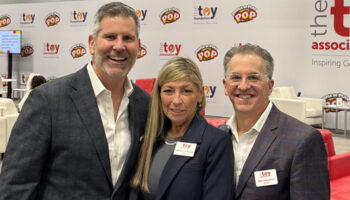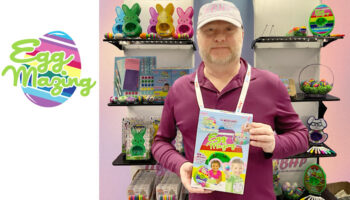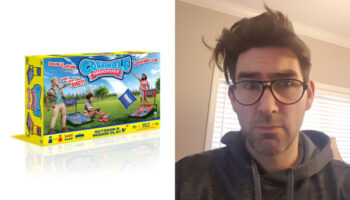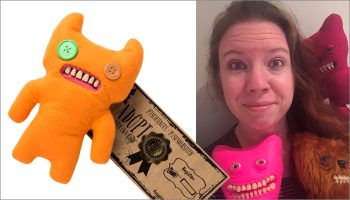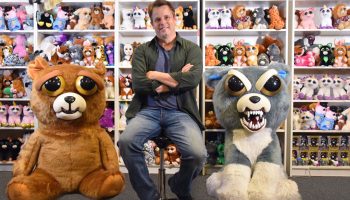What do inventors need to know about selling? Specialist retailer Clea Ewing on why opening boxes closes sales
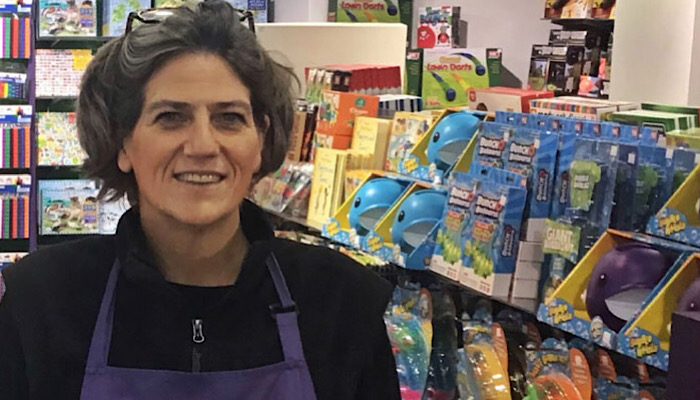
With almost constantly-dismal reports on the state of the UK High Street, it’s refreshing to chat with a specialist retailer who continues to trade with zip, zing and zest…
Fun Learning is a shop that specialises in toys and games with an educational flavour. We spoke with co-owner Clea Ewing to learn what inventors, designers and marketers need to understand about retail…

Clea, you own and run Fun Learning, a specialist toy-and-game shop established in 1993. How did you come to this niche?
By accident. I started working for Fun Learning when the then owner and founder was trying to create a retail offering for the “graduates of the Early Learning Centre”. After a couple of years, he decided that retail wasn’t for him and offered me the opportunity to buy the company. My husband and I felt the concept had merit and decided to take it forward. As we’ve evolved and changed over the years, the core belief in toys that educate, entertain and inspire has been the mantra.
Toys that educate, entertain and inspire! That’s great. You say you’ve evolved and changed over the years – what’s changed in the market since you began?
In the beginning, a key product for Fun Learning was the CDROM! We demonstrated the latest in educational software – games and reference – on PCs and Apple Macs. We got many comments from customers that the Apples were an odd, niche platform to support as they had such a small customer base in the UK. When technology moved on, we migrated away from tech, and as the Early Learning Centre disappeared from the high street, we bled down in age.
To focus on what?
Well, today, our focus is on toys that develop skills and interest in subjects like Science, Coding, Logic, Arts & Crafts – but they’re all ‘doing’ toys; toys that need some engagement from the user. Our strongest products are in the logic and problem-solving category, and the family-games categories. There’s a growing desire for screen-free activities.

In terms of screen-free Science, Technology, Engineering, Maths and the Arts, do you have a stance on STEM versus STEAM? As marketing call-outs, do they help you sell?
STEM has more meaning for us. The arts and creative side are really important but a completely-different skill set. Most parents buy a product because they want to develop a skill or improve understanding in a particular subject. They ask for a product about space or maths or construction… The STEM badge is a top-note indicator that the product will be worthy – but parents don’t use the term.
And just so we have a frame of reference, what are your strongest products?
IQ & Logic puzzles from companies like Smart Games and Thinkfun; the Klutz range of creative books, science kits from Learning Resources, quirky games like Mancala and Rat-a-Tat Cat… And anything that helps with the dreaded times tables…
Oh gawd. We’d rather you hadn’t said “times tables”; you’ve soured the mood! That aside, you must see a lot of great products… What do you look for when you buy?
I train my staff to visualise a thought bubble of “So what?” above the head of the customers they’re speaking to about product. This disciplines a selection process: we have to see – and be able to articulate – a tangible benefit to the consumer. That means we don’t participate in a lot of the fads and media lead drivers in the industry.

So there are things you don’t stock? Licensed products, for example?
Yes; we don’t sell any licensed stock on principle. We avoid a lot of the traditional mainstream toys as they don’t fulfil our objectives, and they’re so readily available elsewhere. The products that we sell well have an obviously developmental benefit so we’re very different from a mainstream toy shop. We love products that are ambitious for kids; that want to teach them how to draw, to code, to problem solve. The design and quality of the components has to be attractive enough to survive opening the box and exposing them to the customer, pre-purchase.
You want every customer to leave Fun Learning with the right product or advice. And from the way you just opened a Mancala, taught us to play, then sold it to us, it has to be said… You really do seem to do it! What’s your secret?
We have knowledgable staff. We get the product out of the box and demonstrate. We speak to both the parent and to the child.

You just made retail sound like the easiest job in the world! Presuming that inventors, designers and marketers value your ethos, how can they help support you?
We need to know what’s great about your product – three reasons why a parent would want it for their child. And then, of course, it has to deliver. I’d also say build plans for creating events into the marketing package… Cardboard Point of Sale and video screens don’t impress anyone anymore!
If you could have inventors understand just one thing about retail, what would it be?
That a lot of effort goes into having shop doors open for 363 days of the year, and into having a customer experience that builds loyalty. Those retailers that are doing it well, have direct access to the public…
Are there any products that you feel are under-appreciated?
There are so many fantastic family games and educational puzzles; not just Pictionary and the Rubik’s Cube. Our shop is full of unsung heroes; too many to name… But that’s what customers come in for. They buy the obvious products online, for the best price. For inspiration and great advice about the best products – as opposed to the best known – it’s worth a trip to the High Street.
Clea, we’ve kept you from working for ages, and you’re so busy – thank you. One last question: as a retailer, what’s the most frustrating practice in the toy-and-game industry?
The UK is very geared up for high-volume, big-retail companies. The movement currently is about creating theatre and entertainment, and the independents are well placed to create that engagement – but it’s difficult to get support from suppliers. Money is spent on purchasing prime placement in retail and online, but not on providing samples and training for frontline staff. If you look to the example of Selfridges, there’s a real opportunity to create excitement and showcase new products in the retail space – but it needs partnership.
—–
To stay in the loop with the latest news, interviews and features from the world of toy and game design, sign up to our weekly newsletter here





